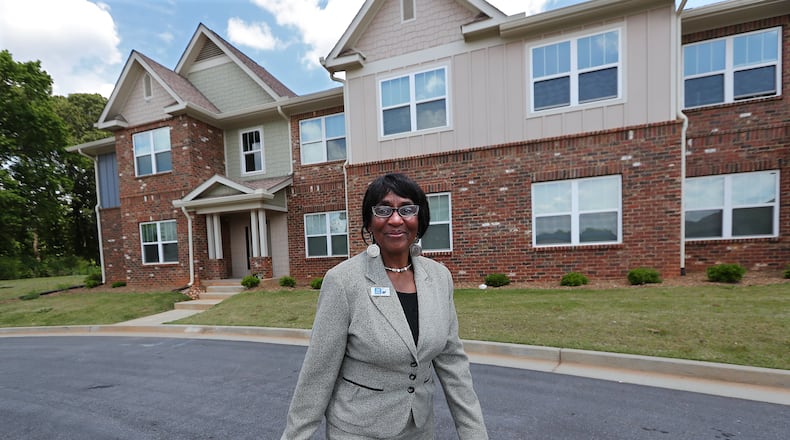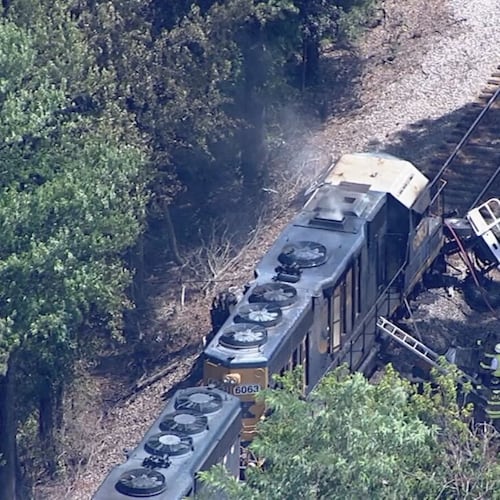The old public housing units in Lawrenceville and Buford, some that date to the 1950s, are on their way out.
And Deborah Ingle, for one, won’t miss them.
Ingle, who’s lived in public housing in Lawrenceville for six years, is thankful for the home she has and the community of which she’s a part. But the floor plan in her unit isn’t inviting, she said, and the kitchen doesn’t have a dishwasher – something she misses sorely.
“I’m going to have a brand-new everything,” said Ingle, 73. “It’s like buying a brand-new house, which I have never done. How blessed can you get?”
Efforts are being made across the state to upgrade existing public housing by renovating or building new homes and, in some cases, surrounding them with mixed-income communities. With oversight from housing authorities, private developers are building many of them with the help of tax breaks or other incentives.
The Gwinnett cities of Buford and Lawrenceville both have projects in the works, while Norcross is in the early stages of upgrading its public housing. Buford will replace or renovate about 140 units, tearing down two communities and adding three more. Lawrenceville will expand the number of affordable apartments in the area, blending new public housing units with affordable and market-priced apartments.
The Paces Foundation, an affordable housing developer, will build the approximately $34 million investment in Buford using low income housing tax credits from the U.S. Department of Housing and Urban Development.
One Street Residential is building two Lawrenceville projects, developments that will cost an estimated $60.8 million. Lawrenceville developers will also make use of these credits for the city’s affordable housing projects.
The developers were awarded tax credits for the planned projects, which they sell to companies to fund the bulk of the construction. Public and private funding will round out the construction costs.
Making affordable housing ‘fit into the community’
Hearthside Lawrenceville will become the new home for residents relocated from 20 public housing units around the city, and will bring 120 additional affordable housing units to the area. Ingle will be one of the 20 families to relocate there.
The new units will serve residents who earn up to 80% of the area’s median income. The median household income is $52,500 a year in Lawrenceville, according to the most recent U.S. Census survey.
A family-oriented development in Lawrenceville, South Town Square, will mix 40 public housing units with 116 apartments that are affordable or that rent at market rate.
“Nobody’s going to know who’s low-income and who isn’t,” said Ingle, who pays $197 a month in rent. “Everyone I’ve talked to is absolutely so excited about moving. It really looks nice.”
Rick Porter, the owner of Richport Properties and one of the Hearthside Lawrenceville developers, said improving public housing creates a more economically diverse, stable community. The new developments also help solve some of the region’s issues by allowing people to live in desirable areas, he said.
“We’re not forcing people to drive to afford a place to live, then drive to afford to make a living,” Porter said.
To the north of Lawrenceville, the Buford Housing Authority plans to scrap its own outdated public housing from the 1950s and ’80s, building new townhomes and apartments in a contemporary style with modern appliances.
Linda Johnson, a former house cleaner who has lived in public housing for 13 years, will move into a new home that’s twice the size of the 1950s one she’s vacating on East Park Street without a hike in rent.
Credit: Contributed
Credit: Contributed
“Before I needed affordable housing, I heard people call them ‘the projects,’” Johnson said. “This new development will certainly change that perspective. All together, it won’t be the projects ever again.”
Approximately 73 units on East Park Street and Forest Street will be torn down and the residents moved into new and existing developments in downtown Buford. In place of the old homes, Buford City Schools plans to construct a new stadium with parking on Forest Street, with room left over for potential development on East Park Street.
Johnson will live in Handsel Morgan Village, a new community at Elliott and South streets. It will have 45 one- and two-bedroom homes in quadplexes, geared toward tenants ages 55 and older, with a walking path and pavilion area.
A family-oriented community named Mary Alice Place will go up on Arnold Street with 20 three- and four-townhomes and a nearby playground for children. On a street that will be built called Hill View Drive, there will also be 10 three- and four-bedroom townhomes. The 70 existing units in the Circle View community will undergo interior and exterior renovations.
The modernization of Buford’s public housing units is long-awaited and much-needed, said Kevin Jones, executive director of the Buford Housing Authority.
“Building standards, quality and everything else has changed a lot over the years,” Jones said. “I’ve been thinking for a while how we can get out of some of this older housing and into modern housing ... make it fit into the community.”
Buford City Commissioners are scheduled to vote on rezoning requests for the project in June. Jones expects to break ground this year, finishing the project 12-18 months later. The timeframe is similar for Lawrenceville.
‘This is a blessing’
Tenants like Johnson pay 30% of their gross income toward rent. With her main source of income coming from Social Security, Johnson pays about $140 per month for her current two-bedroom home.
“Sometimes, I would hear about the length of the waiting list of people wanting to get into here,” Johnson said. “I always felt like I won the lottery twice. And now a third time.”
Some change has already happened in Lawrenceville, where 36 units at Thompson Square opened in 2019. Residents from three different public housing projects moved in.
One, Canary Gordon, had lived in her old duplex for seven years. Gordon, 72, described the old home as cozy. She said she misses the flower garden she planted year after year. But she said she came to love her new place, which overlooks trees and is full of windows.
“This is a blessing,” she said of the new apartment, which costs her $143 a month. “It’s uplifting. The layout is very beautiful. … When you walk in here, you feel joy, you feel happiness.”
Credit: Curtis Compton / Curtis.Compton@
Credit: Curtis Compton / Curtis.Compton@
A quarter of the 156 units at South Town Square in Lawrenceville will be market rate, while about half will be available to renters at 60% of the area median income. The rest will go to relocated tenants who are already in public housing.
Outside of the public housing units, rent at South Town Square will range from $790 to $1,450 a month, while rent at Hearthside will be between $670 and $1,330.
The public-private partnerships funded through the tax credits make a difference in the kind of units that can be built, said Lejla Prljaca, executive director of the Lawrenceville Housing Authority and the Gwinnett Housing Corporation. She called the addition of more affordable units in the city “a big triumph.”
“We recognize how valuable affordable housing is to the whole community,” she said. “It’s important to show the community and elected officials this is what affordable housing can look like.”
The Latest
Featured







